In this month’s review of newly released titles, we’re looking at works from Denmark, Mexico, Palestine, Spain, Argentina, Japan, France, and Taiwan. From a haunting volume of ecopoetics to the first book in an acclaimed metaphysical septology, from powerful anticolonial verses to a meditation on the art of translating, read on for some of the best work being released now in English!
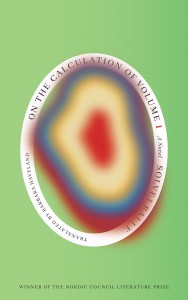
On the Calculation of Volume (Book I) by Solvej Balle, translated from the Danish by Barbara J. Haveland, New Directions, 2024
Review by Rachel Stanyon
After an unremarkable day spent on a business trip in Paris, Tara Selter is enjoying breakfast in her hotel when it strikes her that it is yesterday again. In the first book of Solvej Balle’s seven-part On The Calculation of Volume, Tara’s eighteenth of November begins repeating itself.
What possibilities exist upon the dawning of an old day? Are there wrongs to right, missed opportunities to seize, risks to take or temper? Balle’s heroine does not seem to perceive any such problems or desires; she likes her fairly routine job as an antiquarian book dealer, and works alongside her husband, Thomas, whom she loves. She does not seem to want for nor regret anything, and has blind faith in Thomas, who believes her when she tells him about her repeating days (at least the first umpteen times).
So why has her time “fallen apart”, and what can be gleaned from observing this procession of almost identical days—slowly, meticulously, rhythmically—through the diary Tara keeps? (In this version of eternal return, some of Tara’s physical imprints on the world remain indelible.) Book I details a year (the first of many?) spent haunting the all-too familiar patterns of her husband, all the while lost in loneliness and musing on the volume of her existence. Is she an all-consuming “beast, a pest” or a “tiny monster in an immense space”?
Tara’s struggle to find a cause or way out of this metaphysical conundrum is fruitless: by the end of Book I, 366 eighteenths of November have passed, and Tara is left hopeful, but none the wiser. Balle has said in an interview that she landed on the conceit of a time loop long before she began writing these novels, and this can be felt in how the text’s ideas unfold as a thought experiment without an underlying hypothesis—although this lack of guiding principle may well be a truer reflection of how we react to and reflect on the situations we find ourselves in. The meditations here—translated by Barbara J. Haveland in a hypnotic, measured prose—on memory, closeness, consumption, the significance of time, and the individual nature of human experience, are worth mulling over. But will it be worth spending another six volumes with Tara to work through all these calculations? Only time loops will tell.

The Company by Verónica Gerber Bicecci, translated from the Spanish by Christina McSweeney with an epilogue by Cristina Rivera Garza, Sundial House, 2024
Review by Jonathon Atkinson
In 1935, mercury was found in northeast Zacatecas, and a mine and a town—both named San Felipe Nuevo Mercurio—were quickly established to reap the wealth. The population swelled to ten thousand people, many of whom became victims of mercury poisoning. By the 1970s, just as extraction at Nuevo Mercurio began to ebb, the United States illegally deposited leaky barrels of hazardous waste in the mines, exposing even more residents of the area to damaging toxins.
The Company, artist and writer Verónica Gerber Bicecci’s oral history of these events, is full of rage but also bewilderment; its exposure of unconscionable harm is both dismaying and—because it is so carefully, ingenuously observed—energising. Despite being a work of nonfiction, Gerber Bicecci conjures the air of an especially fucked-up fairy tale, in which things just keep collapsing.
The tale is strange from the beginning. A man named Jose Espinosa discovers the mercury in Zacatecas while searching for honey, which he notices is suffused with mercury, dying some of the surrounding rocks red. He presents his findings to a prospector, who, in a bizarre dramatic flourish, pauses to lick the rocks clean before announcing that they’ve struck the motherlode.
Like so many images in The Company, this one—an eager tongue running over sticky red rocks—is nightmarish, hovering in the field of vision. Gerber Bicecci lays the groundwork for this unnerving intimacy in the first part of the book, which features a deserted Nuevo Mercurio through a series of black-and-white photographs, accompanied by the text of ‘The Houseguest’, a short story written by the Zacatecas author Amparo Dávila in 1959. In Dávila’s story, a housewife narrates her alarm when her husband invites a stranger to stay at their house. ‘My miserable life became a hell,’ Dávila’s unnamed narrator says:
I couldn’t help it; he filled me with mistrust and horror. ‘He’s completely inoffensive,’ my husband said, looking at me with marked indifference. ‘You’ll get used to having him around, and if you don’t. . .’ It was impossible to convince him to take him away.
Gerber Bicecci barely modifies ‘The Houseguest’: in her rendition, she uses the second person instead of the first, replaces the past with the future tense, and changes the names of two of the characters—the houseguest becomes ‘the Company’, and the housewife’s maid becomes ‘the machine’. But the implications of these adjustments are profound. The rewritten story functions like a tuning fork, its menaced claustrophobia evoking what the residents of Nuevo Mercurio have endured. Tweaked in this way, the invasion doesn’t just apply to those people, back then. The disaster is still underway, Gerber Bicecci suggests. It’s coming for you.
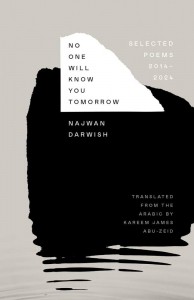
No One Will Know You by Tomorrow: Selected Poems 2014-2024 by Najwan Darwish, translated from the Arabic by Kareem James Abu-Zeid, Yale University Press, 2024
Review by Xiao Yue Shan
In the film The Shadow of the West, Edward Said is speaking to a circle of Palestinian women, refugees in Lebanon. Smiling, he asks one of them: ‘How long have you lived in this house?’ She responds: ‘Sixteen years.’ He follows up: ‘And yet you don’t feel like it’s home?’ The woman puts up her hands in a gesture of isn’t-it-obvious: ‘No, It’s not my house. It’s not my property or my land. My home is Palestine and my land is Palestine.’
Throughout Najwan Darwish’s elegiac and tempestuous selection of poems, No One Will Know You by Tomorrow, the poet expresses a tortured relationship with this exact conviction—the unwavering belief that the Nakba and all of its horrors is only temporary, that the Palestine people will inevitably make their rightful return, and that the land with its olive groves and shimmering Mediterranean shores lies beautiful and waiting for its true owners. In forming a poignant and vividly contemporary portrait of cultural grief and its psychic devastations, Darwish interrogates the shift that occurs within a multi-generational endurance, grasping at the impossible nature of loving what has been violently taken away: ‘The earth—all of it—is a house of refuge. / The people—all of them—are citizens of dust.’ Because many decades later, the pain is not only rooted in that loss, but also the plague of love—an adulated confluence that refuses to delineate the self from what it has been deprived of, continually invoking communal suffering as a consequence of devotion and the right of belonging.
Confronting an ever-mutating paradigm of abandonment—the divine abandoning humanity, the land abandoning its people, the mind reckoning with abandoning a tragic legacy—Darwish draws upon a long, extraordinary lineage of poetics, invoking figures of history and myth, channelling his people and nature’s own indomitable traces, and follows in the necessary mode of representing an anti-colonial struggle. Yet what haunts these poems most vividly is the urge to be free from a singular hope that annihilates other possible futures, and the individual need to situate oneself outside of where history has placed him. Considering the long years that have been endured with patience, bloodshed, and endless disappointment, he says to his country: ‘Your job, now, is to step out, / lovesick and afraid, / and come in search of me.’
In this, the poet theorises that literature can act as a salve for exhaustion by creating intimacy. When writing asserts the tension portioning knowledge (must I continue to want the impossible?) against belief (but perhaps it is not impossible), it can oscillate more freely between a shared idealism—necessary for collective action—and the alternative, transformative possibilities that stem from the dignity of independent opinion. Great revolutionary writers have demanded that aesthetic and personal visions be set aside for the purposes of solidarity and national struggles, but Darwish’s work represents a differently vivified resistance in refusing to disappear into the greater political rhetoric. ‘I never doubted my people,’ he insists, and there is more than sufficient evidence here to prove that he has heard and inhabited their cries—but the poet is not a sloganeer, he is an interpreter of the moment. His job is to gift reality an emotional and spiritual momentum, to liberate it from custom and reductions, to turn it into a moving, human language and therefore, a meeting-place. In his poems the ‘we’ is always alive and always pulsing, but it is not only a crowd chanting in unison for justice—it is him speaking to you.
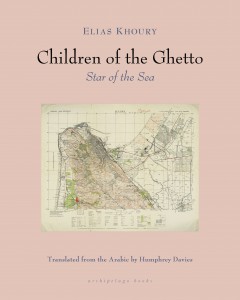
Children of the Ghetto: Star of the Sea by Elias Khoury, translated from the Arabic by Humphrey Davies, Archipelago Books, 2024
Review by Eva Dunsky
In Children of the Ghetto: Star of the Sea, the second instalment in Elias Khoury’s trilogy (translated by Humphrey Davies), Adam Dannoun (also known as Adam Danon) forfeits his Palestinian identity and pretends to be Israeli. The 1948 Nakba had claimed his father’s life and relegated his mother to an existence controlled by her abusive second husband, and in Haifa—where his mother moves after his father’s death—Dannoun leaves this history behind to ingratiate himself with an Israeli mechanic, who helps him craft his new life as an Israeli child descended from Polish Holocaust survivors. From there spins a series of torrid love affairs, a degree in Hebrew literature, and a slow but thorough loss of his original self.
But it isn’t just Adam; in this book, no one is who they seem, from the olive-skinned Polish woman Adam falls for in Warsaw, whose father is actually a Palestinian in hiding, to the daughter of an Iraqi-Jewish family who turns out to be of Lebanese and Palestinian descent. The moral, if overdetermined by several more plotlines like these, rings true: ethnic identity can’t be siloed. Lived experience transcends categories. Draw your own conclusions about what this means for a Jewish state.
Adam’s ambition is to be a writer, but in an explicit postmodern turn (Khoury mentions Adorno’s proclamation of poetry’s death several times as a precursor to Adam’s condition), he’s unable to transmit the silence and fracture of his story into language. Even when the words do come, they betray him; he’s stymied by his inability to claim his place within either Hebrew or Arabic literary traditions. To Adam, language is something that has distanced him from his history, and more tangibly, disinherited him from his ancestral land. Khoury satirises this in a passage describing the refutation of Palestinian claims to citizenship, specifically with the nonsensical term ‘present absentee’, which refers to internally displaced Palestinians who lost their homes but still remain in Israel. Through such deft insight into categorisation, Khoury outlines an experience of diaspora that is at once complex and interconnected—doing what his narrator cannot.
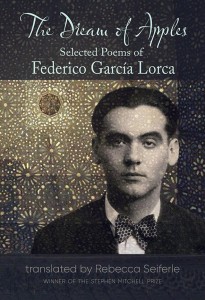
The Dream of Apples: Selected Poems of Federico García Lorca, translated from the Spanish by Rebecca Seiferle, Green Linden Press, 2024
Review by Xiao Yue Shan
When a poet becomes a totemic part of the English-language canon, it is easy to forget the translators that helped get them there. Federico García Lorca has made his indelible presence in the minds of Anglophone readers through a remarkable array of poetic voices—Robert Bly, W.S. Merwin, Paul Blackburn, Sarah Arvio, and Langston Hughes, among many others—but this latest edition of Selected Poems, in Rebecca Siferle’s iteration, offers a prismatic, multi-timbred version of the poet that aims to capture what Siferle calls an ‘interpenetrative depth’ that has been previously ‘resolved to romance or the exotic’. Those previous translations gave us the Lorca of duende, of the elements’ interplay, of ecstasy and tragedy, and that beloved poet is still here, calling ancient symbols into a choreography of ardour and annihilation, but what comes into brighter clarity is a more grounded writer—one that does not only render the drastic nature of being alive, but introduces a self-awareness that distinguishes Lorca as musician (who channels from an immense, perhaps incomprehensible beauty) from Lorca as conductor (who identifies himself as the point where all things collide).
Take the piece ‘Narcissus’, where there appears the lines ‘el espejo en que se miran / tu delirio y mi delirio’. William Joy Smith had translated this as ‘the glass which mirrors / your delirium and mine’, putting the focus on the drama happening inside the reflection, but Seiferle gives us a poet who stands in front of this vision and sees: ‘the mirror where your delirium / and my delirium look at each other’. Lorca has spoken of his writing as drawing from tremendous energies, and thus one can interpret his corpus as an unfettered flow of passion—yet these poems do much to temper the intoxication, drawing it from incendiary heights to an immediate, lucid evocation. In reading them one can sense that the enormity of his landhood and poetic influences (Romani, Arabic, Afro-Cuban) is with the poet in the room, introducing an otherworldly intensity that is very much of the world. For the world is indeed a place where a bull has torn a young man to pieces, where a beautiful girl picks olives forever, a world where night reaches its brown arm in through a window. World of archaic, excruciating violence; world of drastic and desirous love; world where emotions can seem as eternal as statues. There is nothing more distant to us than our own history, but the poet sees it all churning upon a great wheel, and returns the nearly-gone to our present.
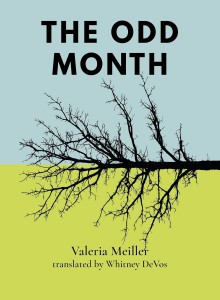
The Odd Month by Valeria Meiller, translated from the Spanish by Whitney DeVos, Black Ocean, 2024
Review by Xiao Yue Shan
Poetry performs its magic on two phenomenological levels: first immersion, then surprise; to pull you into the world of that language, and then to jostle you with what can happen within it. With prose poetry, sentences lure you into the pace of narrative, leaving room for the poetics to enter with an unexpected—even unreal—turn of phrase. In Valeria Meiller’s The Odd Month, a collection of twenty-nine vignettes, there is much to carry the reader along—the air of mystery and barely-suppressed doom, the humming mechanics of violence barely backgrounded, and the penetrating tints of emotion that fortify each image—but what really makes it work is the genuine shock of how these visualities, this rural landscape, are rendered into striking picture and discrete symbol; here, the hide of an animal ‘splits open ferociously, like a shoot ruptures a seed’. At once, you get it; a cycle of growth and destruction, of violence in birth and in death, irreparable wounds, the desire to live.
The titular ‘odd month’ is February, which in Meiller’s native Argentina represents the time of harvest, but as the poems sketch out the drought that transforms the fields to dust, the agricultural cycle is emptied of true sustenance, and instead only performed in the rituals of the small family who depend on it to live, who ‘imagine a future of water’. The woman looks at the boy—who is not her son—with pity, with the universal despair between a generation that passes down the ruins, and the generation that inherits them.
Ecopoetics can be an especially effective methodology in investigating our present precarity by refusing to centralise the human experience. In positing what the foreword describes as ‘an active, pluralised lyrical world within which we find multiple subjectivities, human and nonhuman’, Meiller does not construe the people of her poems as victims of the natural world’s whims and catastrophes, thereby avoiding the mistake of much present rhetoric that casts the weather as some villain presence. Here it is not the natural world that terrorises; instead, everything is terrified, tired, quieted. Human frailty diffuses into the wind, the rabbits, the grasses, and this transference of distinct, segregated psyches allows the poet to clearly render what is truly petrifying about living at the end of the world: how easily fear spreads, and how alone we are inside of it.
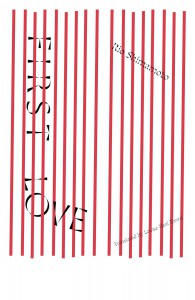
First Love by Rio Shimamoto, translated from the Japanese by Louise Heal Kawai, Honford Star, 2024
Review by Xiao Yue Shan
It’s no surprise that museums are often compared to churches—sacred places hosting the objects and symbols of soul’s evidence. But in First Love, translated elegantly by Louise Heal Kawai, the novelist Rio Shimamoto proposes a very different likeliness: ‘From a distance, the modern architecture of the detention facility wasn’t entirely unlike an art museum.’ Speaking from the artwork’s point of view, our grand, beloved galleries are nothing but cages, keeping the representatives of beauty sequestered for our admiration, utility, and pleasure. It is this disarming approach to objectification and possession that guides this surprising novel, within which Shimamoto continually introduces layers of emotional complexity to illustrate the socio-cultural entrenchment of sexual abuse, consent, and internalised hatreds.
Taking the format of a legal drama, First Love finds a young girl on trial for her father’s murder. There is no question of her involvement; Kanna Hijiriyama, found covered in blood, has confessed. The only persistent mystery is of her intent, a question posed by the narrator, Dr. Yuki Makabe, who has been assigned to write on the crime ‘from a female perspective’.
But it doesn’t take a psychologist—the signs are easy to recognise. Kanna seems shellshocked, sexually active but undermining of her autonomy in such matters, seemingly confused by her own actions, and denigrates herself with words that seem to have come from someone else: ‘To tell the truth, I’m a liar.’ One is liable to think the worst of what has happened between her and her father, but Shimamoto gradually reveals a sickness that goes beyond one individual; instead, we are taken into less clear-cut arenas of violation, in which gradual accumulations of degradation, negligence, and fear exact their own devastating consequences upon the body.
Many of our harmful attitudes towards female sexuality have been invisibilised and thus reified into perceived truths. Assumptions are made about beauty, about perceived complicity in one’s own abuse, about assent and refusal, and as such, the damage inflicted on victims of abuse can also be invisible—until it’s not. Recent narratives have taken charge of rectifying this longstanding failure by giving language to the institutional ideas, thought processes, and inherited beliefs that create interpersonal ambiguities and ethical blind spots in how we view bodies—but the successful inscription of this reality necessitates an admittance that each story, each relationship, each social interaction has its own discrete, intricate formula. The triumph of First Love, then, is to refuse compartmentalisation and simplification while holding clear to the salient truth: we have always an obligation to understand one another, and a right to be understood. Before condemnations, before recriminations, before healing, this novel emphasises the depth and significance of a deceptively simple question: do you know what has happened to you?
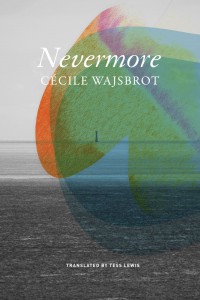
Nevermore by Cécile Wajsbrot, translated from the French by Tess Lewis, Seagull Books, 2024
Review by Eva Dunsky
In Cécile Wajsbrot’s Nevermore, an unnamed translator, deep into rendering Virginia Woolf’s To The Lighthouse from English into French, moves to Dresden—a city where neither language is spoken, but also one that’s familiar with the unembodied and sweeping sense of time and consequences that Woolf’s writing manages to capture, particularly in the ‘Time Passes’ section of To the Lighthouse.
In her translator’s note, Tess Lewis describes ‘Time Passes’ as a ‘ghostly corridor’ linking the first and third sections of Woolf’s novel, and as the narrator considers how to translate its individual sentences, they become springboards for meditations on the nature of memory and loss, both at the personal level and on the universal, nearly incomprehensible scale of the Second World War. An entire novel structured around these free-floating meditations might’ve felt heavy-handed, but in Wajsbrot’s prose and Lewis’s translation, Nevermore never does. In working on ‘Time Passes’, the narrator is able to contemplate other refractions of disaster and reclamation: the environmental aftereffects of the Chernobyl disaster and its residents’ eventual return, the requiems of Heinrich Johannes Wallman, and New York City’s transformation of a defunct railway into a public park, among others.
But before the sentences in Time Passes can prompt the reader to contemplate infamous instances of life after war, Wajsbrot’s narrator takes us through the conundrums of translation, struggling to balance the musicality and meaning of Woolf’s prose in French. Of course, reading the English edition, there’s the meta aspect of Tess Lewis’s masterful translation of Wajsbrot’s French into English. Lewis describes the different strategies she herself employed to replicate the narrator’s own efforts, and together, they give greater insight into the minutiae of translating—both joyful and frustrating, both the gains and the losses—than anything else I’ve seen rendered in fiction.
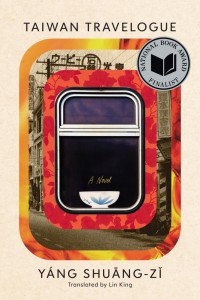
Taiwan Travelogue by Yáng Shuang-zi, translated from the Chinese by Lin King, Graywolf Press, 2024
Review by Eva Dunsky
After Aoyama Chizuko, a young female writer, accepts an invitation from the colonial Japanese government to explore the island of Taiwan in 1938, she arrives wholly uninterested in the imperialist agenda her home country has put together, and remains unwilling to perform the task for which she’s been hired: talking up the Japanese regime. Instead, she’s fixated on food and getting to know the real Taiwan. Frustrated by her assigned guide’s unwillingness to share the local culture (he keeps feeding her udon instead of local cuisine), she insists on travelling with a different interpreter: a young woman she calls Chi-chan.
The two become incredibly close, and Aoyama, who lives an unconventional life in Japan as an unmarried writer and recluse, is unused to the intimacy of close friendship. Rather than accepting invitations and writing her assigned pieces, Aoyama and Chi-chan eat their way through Taiwan. They share their literary ambitions, discuss love and marriage, and reveal secrets. But there’s still a barrier to their intimacy, one that takes the entire novel for Aoyama to unpack. . .
In some ways, Yáng Shuang-zi’s Taiwan Travelogue (translated by Lin King) transcends its time and place, asking questions with obvious contemporary relevance: what do we do when real love and friendship develop within a strictly hierarchical relationship, and when power dynamics prevent us from being fully honest? Yáng is attuned to these reverberations, fitting her novel with clever layers that are sensitive to inter-cultural resonance; for western readers, its questions about exoticism and extractive tourism land differently than they might for a Taiwanese or Japanese reader.
Yet, the narrative is also hyper-specific to a loaded moment in Taiwanese and Japanese history. In some ways, according to Lin, bringing the novel into English only emphasizes this: ‘. . . the English version highlights the linguistic layers more so than the original Mandarin or the 2023 Japanese translation. . . In English, without the shared characters, Taiwanese, Mandarin, and Japanese seem more distant from each other, and the intertwined histories more tenuous somehow.’ This tenuous nature extends from the linguistic context to the hinterlands between romantic love and friendship, between friendship and employment, between appreciation and appropriation—and because Yáng is so comfortable in these gray areas, these questions never feel forced, making this novel a true joy to read.
Jonathon Atkinson teaches in the Language and Thinking Program at Bard College and mentors with the Minnesota Prison Writing Workshop. He lives in Petaluma, California.
Eva Dunsky is a writer, teacher, and translator. Her fiction and nonfiction have appeared in Joyland, The Los Angeles Review, The Rumpus, Bookforum, and Pigeon Pages, among others, and she’s at work on a novel. Read more of her writing here.
Xiao Yue Shan is a poet, writer, and editor.
Rachel Stanyon is a translator from German into English and a senior copyeditor with Asymptote. She holds a master’s in translation and in 2016 won a place in the New Books in German Emerging Translators Programme. Her first full-length non-fiction translation has recently been published with Scribe.
*****
Read more on the Asymptote blog:

